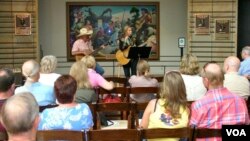Switzerland announced last month that it will ask the United Nations to add Yodeling — a long tradition in the Alpine nation — to the UNESCO global heritage list.
But despite the popular image of the yodeling alpine goatherd, Switzerland does not have a monopoly on the distinctive sound. Cultures all over the world have their own version of the yodel, and even Canadian country music artist Eli Barsi says you can hear it in everything from American cowboy songs to Eastern European, British, Dutch, Scandinavian, Bollywood, Asian, and West African pygmy music.
Yodeling is defined as singing a single note that begins with a low-pitch chest registers and then abruptly jumps to a falsetto head register. While much yodeling sounds spontaneous, Barsi says most artists write unique yodels for each song and sing them the same way every time.
A Blend of Traditions
Country music artists like Barsi have the American cultural stew to thank for the yodels they perform today. German immigrants brought their traditional yodel to the North American plains, while African slaves brought their own broken voice field calls to the Americas.
John Rumble, Country Music Hall of Fame and Museum historian, says the two traditions merged in country music in the early 20th century, thanks to Jimmie Rodgers, who became known as America’s "Blue Yodeler." A fan of traditional European yodeling, Rodgers had daily exposure to African American construction workers who repaired railroad tracks on the line he worked for as a young man. They imbued yodeling with a unique, bluesy twist.
“No one has every surpassed Jimmie Rodgers in terms of the emotion that he packed into his yodels," said Rumble. "And that could be light-hearted, it could be nostalgic, it could even be world-weary.”
Rodgers died in 1933. But in the years since, Rumble says, no yodeler has matched his commercial success.
But while it may no longer enthrall American audiences, Barsi, the Canadian musician, says artists are still yodeling. In fact, she recently conducted live yodeling demonstrations for participants in Nashville, where she saw an expanding range of interest.
“At the western festival and the cowboy festivals we go to, there are a lot of the younger artists that are interested," she said. "So, you know, all of us yodelers try to help them along the best we can, because they are the next generation of yodelers coming up.”
While Barsi notes that examples of yodeling can be heard in genres of music beyond country, she says she also hears broken voice singing — generally described as transitions between different vocal registers of the human voice akin to that of yodeling — in pop, jazz, reggae, and even classical music.
